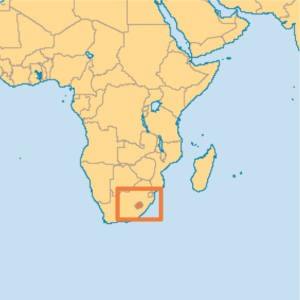AUGUST 12- TODAY’S READING FROM THE ONE YEAR BIBLE- NEHEMIAH 3:15- 5:13; 1 CORINTHIANS 7:25-40; PSALMS 32:1-11; PROVERBS 21:5-7
TODAY’S READING FROM THE OLD TESTAMENT- NEHEMIAH 3:15-5:13
 The Book of Nehemiah records the important efforts that were made to secure Jerusalem with the repair of the city’s walls and gates.
The Book of Nehemiah records the important efforts that were made to secure Jerusalem with the repair of the city’s walls and gates.
We have already seen that Nehemiah’s wise organization inspired great teamwork. People knew with whom they were working, who was working next to them, and to whom they were accountable. There are over 22 references in Chapter 3 to this ‘relatedness.’ We read ‘next to him’, ‘next to them’, or ‘after them’, at least 22 times.
Here is a New Testament application:
We are workers together with Christ as He builds His church.
1 Corinthians 3:10-11 10 According to the grace of God which was given to me, like a wise master builder I laid a foundation, and another is building on it. But each man must be careful how he builds on it. 11 For no man can lay a foundation other than the one which is laid, which is Jesus Christ.
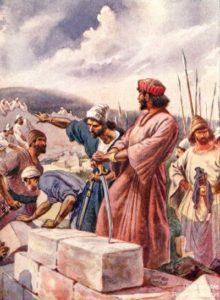 The church’s one foundation is Christ – the sufficiency of His person and the work He accomplished to purchase our salvation. We are baptized by the Spirit into one body, which is the temple of the Holy Spirit, and were all made to drink of this one Spirit. For the body is not one member, but many (1 Cor 12:13-14). Paul then goes on to explain how there is a relationship of interdependence with those with whom we have been positioned and an accountability to the headship of Christ through delegated authority in the local church.
The church’s one foundation is Christ – the sufficiency of His person and the work He accomplished to purchase our salvation. We are baptized by the Spirit into one body, which is the temple of the Holy Spirit, and were all made to drink of this one Spirit. For the body is not one member, but many (1 Cor 12:13-14). Paul then goes on to explain how there is a relationship of interdependence with those with whom we have been positioned and an accountability to the headship of Christ through delegated authority in the local church.
1 Thessalonians 5:12-13 12 But we request of you, brethren, that you appreciate those who diligently labor among you, and have charge over you in the Lord and give you instruction, 13 and that you esteem them very highly in love because of their work. Live in peace with one another.
Hebrews 13:17 17 Obey your leaders and submit to them, for they keep watch over your souls as those who will give an account. Let them do this with joy and not with grief, for this would be unprofitable for you.
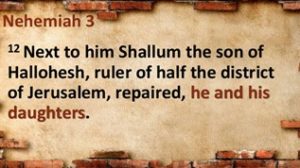 Nehemiah wisely assigned the people to work on parts of the wall that would provide protection for their immediate interests- walls that defended their particular neighborhoods and families (Nehemiah 3:23, 28-30; 4:13).
Nehemiah wisely assigned the people to work on parts of the wall that would provide protection for their immediate interests- walls that defended their particular neighborhoods and families (Nehemiah 3:23, 28-30; 4:13).
Notice that Shallum worked together with his daughters (Nehemiah 3:12).
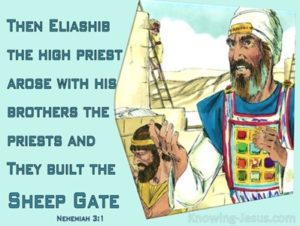 Nehemiah 3:30 30b After him Meshullam the son of Berechiah carried out repairs in front of his own quarters.
Nehemiah 3:30 30b After him Meshullam the son of Berechiah carried out repairs in front of his own quarters.
Nehemiah 3:28 28 Above the Horse Gate the priests carried out repairs, each in front of his house.
Men, women, children, farmer and noble, craftsman and priest, they all worked together with one purpose—to restore the testimony of the Lord, the city of their God and king.
There are parallels to the gospel in the sequence of the City Gates.
 The priests were to recognize that their own sacrifices were but place-holders for the perfect once and for all sacrifice of the Promised Lamb of God who would take away the sin of the world- the Sheep Gate.
The priests were to recognize that their own sacrifices were but place-holders for the perfect once and for all sacrifice of the Promised Lamb of God who would take away the sin of the world- the Sheep Gate.
Bible commentators connect the redemptive activities of the Messiah with other gates as well. At Pentecost, He empowers us to be fishers of men (The Fish Gate), to go with us in the valley (The Valley Gate), to remove the rubbish of our old patterns of behavior with His sanctifying power (Rubbish Gate), refresh us with the fountain of His indwelling Spirit (Fountain Gate), cleansing us with the water of His Word (The Water Gate), and giving us His mighty victory as He returns in power to set up His kingdom (The Horse Gate).
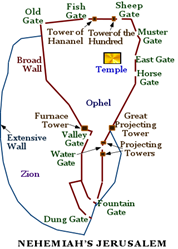 Sanballat was a Samaritan leader, an official of the Achaemenid Persian Empire, who opposed Nehemiah’s work. He attempted to distract, discourage and hinder the building of the walls of Jerusalem by mocking the workers. He was greatly enraged and insidiously slandered the work in front of people whose support Nehemiah needed.
Sanballat was a Samaritan leader, an official of the Achaemenid Persian Empire, who opposed Nehemiah’s work. He attempted to distract, discourage and hinder the building of the walls of Jerusalem by mocking the workers. He was greatly enraged and insidiously slandered the work in front of people whose support Nehemiah needed.
Sanballat was a Horonite, and his friend Tobiah was an Ammonite. They did not have any vested interest in Jerusalem’s success. The Arabs and Ashdodites had reasons to be jealous of the progress that the Jews were making. But there was great animosity between the Jews and the Samaritans.
The word ‘Samaritan’ is used for the first time in the Book of Nehemiah (In Nehemiah 4:2). In the Books of the Kings, we have been made well aware of the wayward history of the northern kingdom of Israel, often dubbed ‘Samaria,’ because of its capital city by that name. Sargon II of Assyria conquered the city of Samaria after a three-year siege started by Shalmaneser V and deported the captives of Israel to Syria. He repopulated Samaria with captives from other lands. Consequently, the few Israelites that remained intermarried with the immigrants and formed a mixed people group that became known as ‘Samaritans’. The Jews who returned to Jerusalem in Judea would have nothing to do with the Samaritans. They were considered pagans and racially impure.
By the time of Jesus, 400 years later, we learn that there was still great animosity between the purer bred Jews of the south and the interbred Samaritans of the north.
John 4:9 9 The Samaritan woman said to him, “You are a Jew and I am a Samaritan woman. How can you ask me for a drink?” (For Jews do not associate with Samaritans.)
 Not only did Sanballat ridicule the Jewish workers on the wall, but he was ready to start a fight.
Not only did Sanballat ridicule the Jewish workers on the wall, but he was ready to start a fight.
Despite the enemy’s verbal ridicule and continual threats of physical attacks, the work went on. This had a lot to do with Nehemiah’s leadership. He knew how to keep his fellow workers motivated. They had ‘a mind to work’ (4:6). He addressed their fear (of the enemy) and their discouragement (due to all the rubble, the residual damage of what the enemy had done, which was getting in the way of construction).
- He reminded them what was at stake: THE TESTIMONY OF THE LORD.
- He reminded them what they were fighting for:
Nehemiah 4:14 14 When I saw their fear, I rose and spoke to the nobles, the officials and the rest of the people: “Do not be afraid of them; remember the Lord who is great and awesome, and fight for your brothers, your sons, your daughters, your wives and your houses.”
- He organized the project so all were involved and appreciated each other’s contributions to the work.
- He continually watched and prayed.
Nehemiah 4:9 9 But we prayed to our God, and because of them we set up a guard against them day and night.
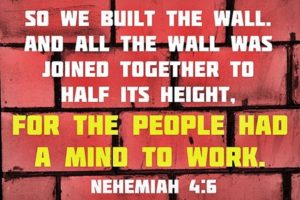 The work progressed through prayer and persistent action.
The work progressed through prayer and persistent action.
Nehemiah 4:6 6 So we built the wall and the whole wall was joined together to half its height, for the people had a mind to work.
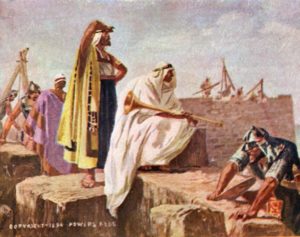 Nehemiah knew what was at stake. He communicated the importance of the work to his fellow laborers. The enemy used fear tactics to intimidate and confuse. Nehemiah developed a communication system of sounding trumpets that kept workers alert and informed (Nehemiah 4:19-20). He had a trumpeter standing near him so he could communicate timely warnings to the entire team.
Nehemiah knew what was at stake. He communicated the importance of the work to his fellow laborers. The enemy used fear tactics to intimidate and confuse. Nehemiah developed a communication system of sounding trumpets that kept workers alert and informed (Nehemiah 4:19-20). He had a trumpeter standing near him so he could communicate timely warnings to the entire team.
Nehemiah assured them that the project would provide needed protection for their families against the real threat of enemy invasion. Border security and a proper mechanism to oversee admission into the city are essential for the prosperity of the inhabitants. Nehemiah must have communicated this effectively, as the people were willing to work night and day. They did not take off their work clothes and always kept a weapon in one hand and a building tool in the other.
Nehemiah 4:17-18 17 Those who were rebuilding the wall and those who carried burdens took their load with one hand doing the work and the other holding a weapon. 18 As for the builders, each wore his sword girded at his side as he built, while the trumpeter stood near me.
This passage also reminds us that some degree of sacrifice is involved in the building up and protecting of the testimony of the Lord in the church. There are seasons when we will have to sleep in our work clothes, maintain a ‘high alert’ and remain on-site, performing guard-duty at night and builders by day (Nehemiah 4:22).
The New Testament application is that our work for the gospel requires both building (1 Corinthians 3:10-17; 2 Corinthians 12:19; Ephesians 4:12) and battling (Ephesians 6:10-20). It requires that every member be ready with both the sword and the trowel in hand.
In Chapter 5, Nehemiah hears of the financial hardships of his people. Many are having to borrow money to buy food and are being charged heavy interest by their creditors.
As long as a person is operating according to the old nature (the flesh), there will be self-interest, self-deception, self-justification, leading to disputes, fights, and oppression (James 4:1).
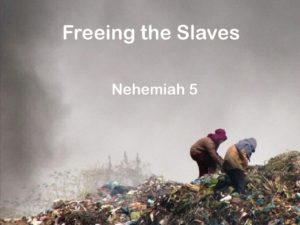 Due to a famine, there were genuine needs in the community that was overlooked or taken advantage of. According to the Torah, provision should be made for the needs of the poor. The nobles and officials were lending money to their brothers and charging high interest that forced people to have to put family members into slavery in order to make repayments.
Due to a famine, there were genuine needs in the community that was overlooked or taken advantage of. According to the Torah, provision should be made for the needs of the poor. The nobles and officials were lending money to their brothers and charging high interest that forced people to have to put family members into slavery in order to make repayments.
Nehemiah 5:3-5 3 There were others who said, “We are mortgaging our fields, our vineyards and our houses that we might get grain because of the famine.” 4 Also there were those who said, “We have borrowed money for the king’s tax on our fields and our vineyards. 5 “Now our flesh is like the flesh of our brothers, our children like their children. Yet behold, we are forcing our sons and our daughters to be slaves, and some of our daughters are forced into bondage already, and we are helpless because our fields and vineyards belong to others.”
Nehemiah is angry. He ‘takes counsel with himself’.
Nehemiah 5:7 7 I consulted with myself and contended with the nobles and the rulers.
This is unlike the practice of the rich farmer in Jesus’ parable who mistook the needs of his body for his soul (mind, emotions, will, and educated conscience).
Luke 12:19 19 ‘And I will say to my soul, “Soul, you have many goods laid up for many years to come; take your ease, eat, drink and be merry.”‘
It is good when we are angry to slow down and take reasonable consultation with our souls. Bring all the facts to your mind. Do not give in to the cry of your emotions alone. Commit your will to do what is pleasing to God and in the best interests of others. That may be the hard thing, like confronting others with a difficult conversation.
Jesus outlines a way to resolve conflict in Matthew 18:15-18. It seems that in Nehemiah’s situation, the exploitation of members required a general meeting.
Nehemiah 5:8b-9 7 Therefore, I held a great assembly against them. 8 I said to them, “We according to our ability have redeemed our Jewish brothers who were sold to the nations; now would you even sell your brothers that they may be sold to us?”
Nehemiah reminds them that slavery has been a part of their history. (Joseph’s brothers sold him into slavery. The Jews were slaves in Egypt.) God’s intention is always to set the captive free. Why then were they enslaving their brothers?
The moneylenders were silent and could not find a word to say.
Nehemiah asks them to give back what they have taken as collateral on the loans and charge no interest when making loans to their people.
The priests were called to ratify an oath made by the nobles and officials that they would do all that was promised.
Nehemiah shakes the folds of his garment, pronouncing a curse on any who fails to keep this promise (Nehemiah 5:13).
TODAY’S READING FROM THE NEW TESTAMENT – 1 CORINTHIANS 7:25-40
Paul is very aware that in times of heavy Christian persecution, there is great stress upon married couples. He refers to the present moment as being ‘a time of distress’. He could be referring to a famine or simply that the church was going through difficulties. Therefore, those couples engaged to wed or contemplating marriage should think carefully about the implications of these hardships upon their relationships. Paul admits that marriage can increase worldly troubles. In his mind, there is less pressure on a spouse if they face these troubles such as persecution or famine alone. They can pursue the Lord without having to factor in the cost rendered to spouse and family.
 The time is short, and therefore Christians need to be sober-minded and focused, married or not.
The time is short, and therefore Christians need to be sober-minded and focused, married or not.
There are God-given responsibilities associated with being single or married. The Apostle Paul, at this time in his life, is single and recognizes that he is free to risk travel and long periods of pioneer evangelism, discipleship, and church planting.
1 Corinthians 7:32-34 32 But I want you to be free from concern. One who is unmarried is concerned about the things of the Lord, how he may please the Lord; 33 but one who is married is concerned about the things of the world, how he may please his wife, 34 and his interests are divided. The woman who is unmarried, and the virgin, is concerned about the things of the Lord, that she may be holy both in body and spirit; but one who is married is concerned about the things of the world, how she may please her husband.
Paul’s comments are not intended to be a disapproval of marriage. In his other writings, he shows his high regard for the sacred covenant of marriage as a picture of Christ’s relationship to the church (Ephesians 5:22-33).
Paul also reminds his readers that marriage does not always lead to bliss. There are challenges of hardships, and it requires selfless concern and covenant loyalty to one’s spouse.
A person who is single can also be fulfilled and happy. God gives opportunities for service to both those who are married and those who are single.
Notice Paul’s warning: Only marry ‘in the Lord’. Paul is clarifying that widows are free to remarry, but only to believers. In this culture, when men and women choose their own partners, it is important for Christians to marry only those who are in the Lord.
TODAY’S READING FROM THE BOOK OF PSALMS -PSALMS 32:1-11
 What great news! This is a maskil- a thanksgiving hymn written by King David. He expresses the joy of knowing his sins have been forgiven.
What great news! This is a maskil- a thanksgiving hymn written by King David. He expresses the joy of knowing his sins have been forgiven.
Prior to being honest to God about his sin, he was miserable.
Psalm 32:3-4 3 When I kept silent about my sin, my body wasted away Through my groaning all day long. 4 For day and night Your hand was heavy upon me; My vitality was drained away as with the fever heat of summer. Selah.
But when he confessed his sin (2 Samuel 12:13), David learns through the prophet that the LORD has taken away his sin (2 Samuel 12:14), and he is able to worship with joy.
Psalm 32:5 5 I acknowledged my sin to You, And my iniquity I did not hide; I said, “I will confess my transgressions to the LORD”; And You forgave the guilt of my sin. Selah.
Psalm 32:11 11 Be glad in the LORD and rejoice, you righteous ones; And shout for joy, all you who are upright in heart.
David’s joy resounds God’s faithfulness to the repentant sinner in such a way that it is echoed in the New Testament!
Romans 4:7 7 “BLESSED ARE THOSE WHOSE LAWLESS DEEDS HAVE BEEN FORGIVEN, AND WHOSE SINS HAVE BEEN COVERED. (Psalm 32:1).David can sing, You are my hiding place!
Psalm 32:7 7 You are my hiding place; You preserve me from trouble; You surround me with songs of deliverance. Selah.
God promises to provide daily guidance if we have a willingness to heed his instruction Jesus said this in John 7:17
“If anyone is willing to do His will, he will know of the teaching, whether it is of God or whether I speak from Myself.”
God promises to provide daily guidance if we have a willingness to heed his instruction (John 7:17).
Psalm 32:8 8 I will instruct you and teach you in the way which you should go; I will counsel you with My eye upon you.
David sums up:
Psalm 32:10 10 Many are the sorrows of the wicked, but he who trusts in the LORD, lovingkindness shall surround him.
TODAY’S READING FROM THE BOOK OF PROVERBS- PROVERBS 21:5-7
Proverbs 21:5-7 5 The plans of the diligent lead to profit as surely as haste leads to poverty. 6 A fortune made by a lying tongue is a fleeting vapor and a deadly snare. 7 The violence of the wicked will drag them away, for they refuse to do what is right.
These three proverbs show that our actions bear consequences. Careful planning reaps its reward; hasty planning leads to poverty. Dishonesty in business does not pay off in the long run; it is deadly. And violence is not God’s way, and will catch up with you.
PRAY FOR THE NATIONS- LESOTHO
Kingdom of Lesotho
Africa
Geography
A mountainous country completely surrounded by South Africa. Only 10% is arable.
Population: 2,084,182 Annual Growth: 0.88%
Capital: Maseru
Urbanites: 26.9%
HDI Rank: 156 of 182 (UN Human Development Reports 2009)
Peoples
 Peoples: 13 (8% unreached
Peoples: 13 (8% unreached
Unreached Peoples Prayer Card
Official language: Sesotho, English Languages: 6 All languages
Religion
Largest Religion: Christian
|
Religion |
|
Pop % |
Ann Gr |
|
1,861,383 |
89.31 |
0.9 |
|
|
253,040 |
12.1 |
2.7 |
Challenges for Prayer
The mountain population of 600,000 are among the poorest and most vulnerable. Nominally Christian, they have little contact with the life-giving gospel. Lesotho’s churches are beginning to wake up to this challenge. Operation UP, an indigenous agency, is committed to reaching every family in the mountains and planting 50 evangelical churches in the next five years. Other agencies include AIM, Joy to the World, YWAM, Fill the Gap Ministries, the Full Gospel Church, and Global Evangelism Ministries. Many villages are accessible only on horseback, others by MAF plane. Pray for fruitful and sustainable ministry that yields thriving churches.
Christian support ministries:
a) MAF has a unique and vital role in this land of high mountains and few roads. MAF planes operate on 26 landing strips with 17 full-time workers and 6 aircraft. They provide support for Christian workers and a fly-in doctor service. Pray for these pilots, their families/support teams, and for their safety.
b)Youth work. Scripture Union is active in sharing God’s Word with young people, especially through school groups.
c) Christian literature in Sesotho (the mother tongue for most) is in short supply. Operation UP and others are working on addressing this shortage by translating materials from English.
d) Christian radio has had a strong and positive impact in the lowlands. Harvest FM, Catholic Radio, Jesu ke Karabo FM, Mo-African FM and KEL Radio. These stations are instrumental in reaching even non-churchgoers. Pray that they will be used for spiritual rather than political purposes. TWR broadcasts daily in English.
PRAYER: Lord, we thank You for giving us an example of a persistent leader in Nehemiah. We ask that we will be faithful to fulfill the work You have called us to. Keep us stationed with our brothers and sisters under the authority of Your Word. Let us hear the clear sounding of Your warnings and heed Your instructions. Build up the testimony of the Lord Jesus Christ in the church. May we faithfully proclaim the good news that You have provided the means for our sins to be forgiven and for our release from our slavery to sin and the fear of death. In Jesus’ Name. Amen.


